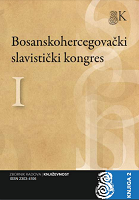Usporedno čitanje bosanskohercegovačke i hrvatske dnevničke proze za djecu i mladež (Zlatin dnevnik Zlate Filipović i Mali ratni dnevnik Stjepana Tomaša)
Comparative Reading of Bosnian-Herzegovinian and Croatian Diary Prose for Children and Young Readers (Zlata’s Diary by Zlata Filipović and Small Wartime Diary by Stjepan Tomaš)
Author(s): Dragica DragunSubject(s): Comparative Study of Literature, Bosnian Literature, Croatian Literature, Theory of Literature, Wars in Jugoslavia, Sociology of Literature
Published by: Slavistički komitet BiH
Keywords: Stjepan Tomaš; Zlata Filipović; Osijek; Sarajevo; diary subject; Cvijeta; Zlata; war; documentary fiction; private; metafictional segments;
Summary/Abstract: The paper represents a comparative analysis of two diary specimens. It considers the non-fictional (Zlata’s Diary) and the fictional (Small Wartime Diary) of two diary subjects – Zlata and Cvijeta and their observations regarding two war-stricken areas – of Sarajevo and Osijek, Bosnia and Croatia. The diaries are recognised as a source of psychological self-help, but also as documents of the specific time. The central topic is the war, which both in Osijek and in Sarajevo brings about destruction of towns, families, friendships; death... Both diary subjects are more or less of the same age and they spend the described period of their childhood in a cellar – place of conditional safety, or separated from their parents. They both notice the consequences and traces of war primarily on the people closest to them. Although the central line of both stories is the war, both Zlata’s and Cvijeta’s records deal also with some topics which are not related to the war, whether on the social, cultural or personal level (the ones which are most frequently recorded in diaries), which are however only temporary digressions sprung from the need to take a distance from the existential anxiety of the girls who, faced with a tragic, wartime context, reach maturity before their time.
Journal: Bosanskohercegovački slavistički kongres
- Issue Year: I/2012
- Issue No: 2
- Page Range: 245-253
- Page Count: 9
- Language: Croatian

